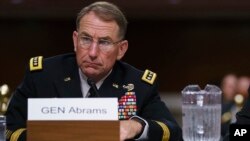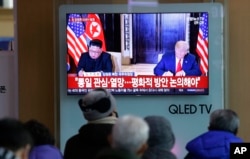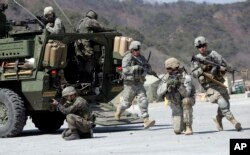North Korea's nuclear and other military capabilities remain unchanged and still pose a threat to the United States and its allies, the top U.S. military commander in South Korea told a Senate hearing Tuesday.
"Little to no verifiable change has occurred in North Korea's military capabilities," despite Pyongyang's public statements about denuclearization, General Robert Abrams, head of U.S. Forces Korea, told the Senate Armed Services Committee.
The comments underscore the stalled diplomacy between the U.S. and North Korea since President Donald Trump and Kim Jong Un agreed last June in Singapore to work toward the denuclearization of the Korean peninsula.
Trump and Kim are set to hold a second summit in Vietnam later this month. U.S. officials have said they expect "significant and verifiable" progress there.
"My personal opinion is the announcement of a second summit...is a positive sign of continued dialogue," Abrams said. "It certainly beats the alternative of what we were living with in 2017."
It has been 440 days since North Korea last conducted a nuclear or missile flight test, Abrams noted. "The reduction in tension on the peninsula, it's palpable," he said.
"Having said all that though, we have not observed activity that's consistent with a full-court press on denuclearization," he added.
Military drills
Meanwhile, North Korea is continuing its annual winter military exercises, Abrams said.
"We have observed no significant changes to the size, scope, or timing of their ongoing exercises," Abrams said, putting particular emphasis on the word "their."
At last year's Singapore summit, Trump announced the cancellation of several major military drills between the U.S. and South Korea, saying they were expensive and needlessly provocative.
North Korea has for decades said the exercises amount to preparation to invade the North -- a notion the U.S. strongly denies.
Some U.S. lawmakers and others have expressed concern about U.S. military readiness, should the exercises be postponed much longer.
Troop levels
Many have also expressed worry that Trump may use the upcoming summit to announce a withdrawal or reduction of U.S. troops in South Korea.
Asked by Senator Jack Reed whether the U.S. can afford to reduce its troop presence, Abrams responded that the current posture "is appropriate in terms of providing an adequate deterrent" against North Korea.
The U.S. currently has over 28,000 troops in South Korea.
Trump has for years complained U.S. troops in Korea are too expensive and do not adequately advance U.S. interests. However the U.S. president, along with the top U.S. envoy to North Korea, Stephen Biegun, have said they are not discussing a troop withdrawal or reduction in the peninsula.
Earlier this week, the U.S. and South Korea signed an agreement that will increase by 8 percent the amount Seoul pays for the U.S. troop presence. Trump had reportedly demanded an increase of 50 percent.
The deal, which is subject to South Korean parliamentary approval, is only valid for one year, unlike the previous agreement, which lasted five years.






